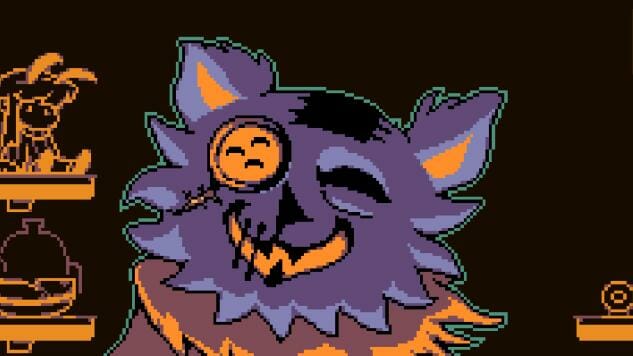
This article contains spoilers for basically all of Deltarune, and most of Undertale. Read at your own risk!
On Halloween last week I had the distinct pleasure of telling a friend who loved Undertale that its quasi-sequel had came out that day for free. Developer Toby Fox broke the silence on his newest project in a distinctly Toby Fox style, dropping what looked like an entire game for free.
This new game, Deltarune (an anagram for Undertale, in case you missed that), is set in a universe that includes many of the characters from Undertale, but re-shuffled into slightly different positions. It’s a seemingly modern setting, with cars and police and churches, and a magic closet in the local school leading to a fantasy land where Light and Dark are continually at war. Most interestingly, the game also is already setting itself up as a thematic counterpart to Undertale, acting in conversation with the previous game’s ruminations on violence and pacifism.
Deltarune isn’t exactly a sequel, as it turns out. It’s a demo, a fairly meaty one at about a three-hour playtime, and while it’s marked as “Chapter 1,” a lengthy clarification from Toby Fox explains that the final project will be released as a single purchase, not split by chapter.
Deltarune opens with a character creation sequence. It then tells the player that whatever choices they made don’t matter, and that they are playing as Kris, a young child in the clothing of Chara (the final villain of Undertale). It is quickly established that this character is, in this world, somewhat analogous to Chara in Undertale. They are the adopted child of Toriel, and their older brother is Asriel, making Kris have the same familial relations as Chara did.
This is the first time that the game is establishing its differences between itself and its predecessor. Undertale was a game that was heavily concerned with the actions that the player took, and how those actions reflected out into the gameworld. If the player was violent, the game would take a darker tone, as the player would be viewed as a force of destruction. Here in Deltarune, multiple characters and early-game interactions underscore the message that in this world, your choices don’t matter.
Kris is a distinct character, not an avatar of the player’s actions in the way that Frisk was in Undertale. Multiple hints to this are already hidden within Deltarune, from the game’s menu screen (which notes that Kris has a human soul), to the first SAVE terminal (which notes a pre-existing save game under the name ‘Kris,’ before it is overwritten by the player’s name), to the game’s ending (showing Kris waking up in the night, plunging their hand into their chest and ripping out the small red marker that is used to indicate the player in combat sequences).
All of this points to Deltarune being a game that wants to complicate the messages of Undertale. Undertale is utopic, in that it believes strongly that all people have the capability to do good if they are given a chance. It’s the backbone of Undertale’s thematic conclusions with its Pacifist route, where the player eschews as much combat as possible and works to help all citizens of the Underground.
Deltarune, in contrast, establishes that there are some evils that cannot be reasoned with. Kris is assumedly one of them, as their analogous relationship to Chara would suggest, but there are smaller moments that emphasize this as well. The final boss of Deltarune’s first chapter is King Spade, the father of a previously-introduced enemy-turned-friend Lancer.
Lancer warns the player that King Spade cannot be reasoned with, that he will kill Kris and their companions no matter what. Nonetheless, I tried to play mercifully, never throwing a FIGHT command during battle, and hoping that I could talk King Spade down.
Here’s the thing: You can end that fight without direct combat. Survive long enough, and the King gives up. He doesn’t want you to succeed in your mission, but he’s tired of fighting such a dedicated team of heroes. And then, assuming you had played mercifully up until that point, he is overthrown by a crowd of angry subordinates, annoyed that he had been treating them terribly.
The message here is that no matter what you (the player) wanted to do, sometimes there are evils that need to be confronted. Undertale almost always had a way out, a way to play that would end with everyone happy and holding hands. Deltarune does not, or at least does not so far.
I welcome this change. Undertale is still one of my favorite games, but it is undeniably a game made with an idealism that almost seems naïve, where all conflict is avoidable because all people (or monsters) are reasonable at their core.
Deltarune does not begin on this premise. People are flawed. One of your primary squad members has a problem listening to you, and will actively attempt to foil your plans for nonviolent play. King Spade is not a character that can be reasoned with. Kris is quite possibly aware of the fact they are a character in a game and is willing to do whatever necessary to enact their goals, regardless of the player’s actions.
A lot could change between now and the game’s release, which currently could be even years away. But even with so little released, it’s clear that Deltarune is trying to complicate the message of “pacifist” versus “violent” playthroughs. Right now, we can only hope that the final product is as thoughtful as this first chapter was.
Dante Douglas is a writer, poet and game developer. You can find him on Twitter at @videodante.

